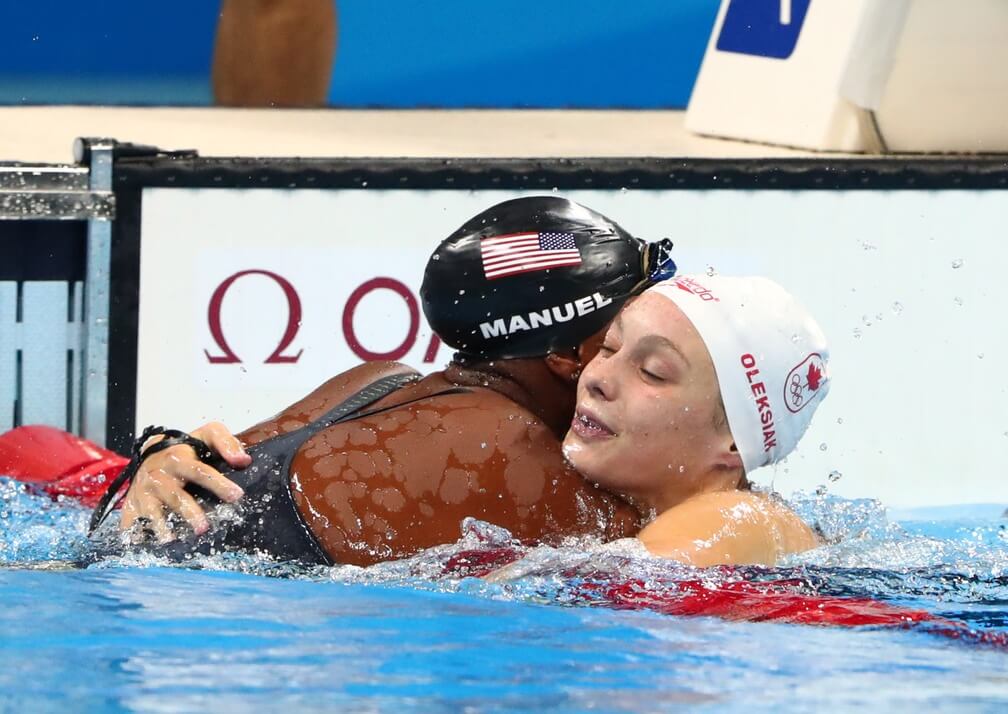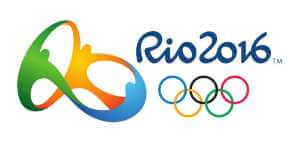For Simone Manuel and Penny Oleksiak, A Shared Gold and Intertwined History


Editorial Coverage Sponsored By FINIS
By David Rieder.
The women’s 100 free had it all: a heavy favorite coming up short, the first women’s swimming gold medalist from one country in 32 years, a racial first in a historically-white sport and a tie. Yes, a tie.
It all started in the semifinals, when Simone Manuel swam a best time of 53.11 to become the second-fastest American ever in the event. It was the first time she had dropped in the event since the Pan Pacific Championships two years ago and a solid step towards a potential medal, a highly unlikely proposition at the end of U.S. Olympic Trials a month ago.
Manuel earned the third seed for the final, and just ahead of her was Penny Oleksiak, who had helped Canada to three medals already in Rio after the country had not won any women’s swimming medals in two decades. The Junior World Record-holder had vaulted herself into medal contention after a silver in the 100 fly and a 1:54.84 anchor leg on Canada’s bronze medal-winning 800 free relay Wednesday night.
Gold? For either, that was unlikely, to say the least.
Not with world record-holder Cate Campbell in the field. Just a month ago, Campbell blasted a 52.06 to clip Britta Steffen’s suit-aided world record of 52.07, and she was heavily favored to add a second gold in Rio after already earning one in the 400 free relay Saturday night. Her two Olympic records in the prelims and semifinals added to her stature as the heavy favorite.
Campbell led at the halfway point, flipping in 24.77, ahead of her own world record-pace. Finally, this would be her moment for individual glory.
But then, with less than 25 meters to go, Campbell’s stroke tempo abated, and she was quickly losing ground. On either side of her, Manuel and Oleksiak were swimming the races of their respective lives.
They hit the wall, and thousands of heads turned towards the videoboard, which showed a “3” in Sjostrom’s lane, a “1” for Oleksiak and “OR” for Manuel. The time for both the Canadian and the American was 52.70.
For the first time in 16 years, a tie for Olympic gold.
“My goal was to get on the medal stand, after seeing how I swam in prelims and semifinals,” Manuel said. “But getting the gold in my first Olympics… I don’t know—I still can’t describe it, but I’m really excited about it.”
“I’m only 16. It’s pretty insane to win a gold medal at your first Olympics when you’re 16,” Oleksiak expressed. “To see that you got an Olympic record and see that you just got gold with Simone, it means a lot to me.”
Most recently, Americans Anthony Ervin and Gary Hall Jr. had tied for gold in the men’s 50 free at the 2000 Sydney Games, but going back another 16 years to the 1984 Los Angeles Olympics, Nancy Hogshead and Carrie Steinseifer, both from the U.S., had been co-winners in the same women’s 100 free.
On this occasion, of course, “Oh, Canada” joined the Star Spangled Banner on the musical playlist.
But this was not just a statistical improbability—this was history.
Oleksiak became the youngest athlete to ever win an individual Olympic gold—the first born after the turn of the millennium—and the first female swimmer from Canada to win gold since Anne Ottenbrite in the 200 breast at those 1984 Games.
“It means so, so much to me because I really want to inspire kids my age or even younger than me to do whatever they wanted to do because people didn’t think I could make the Olympic team, but to be here, medaling and getting gold is a pretty great feeling,” she said.
In the span of six days, Oleksiak has become the poster-child for a new era in Canadian swimming. But the impact Manuel might make on the sport could be even more powerful.
Yes, Manuel did break a streak of American futility in the 100 free—the U.S. had not won gold since the tie in 1984—but more significantly, she became the first-ever black female swimmer to win a gold medal.
(The first black female swimmer to win a medal was Enith Brigitha, who finished third at the 1976 Olympics in the 100 free behind two East Germans.)
That fact meant so much to Manuel, who knows the symbol she can serve as for young African Americans getting into the sport.
“For people that believe that they can’t do it, I hope I’m an inspiration to others to get out there and try swimming,” she commented. “You might be pretty good at it.”
But still, Manuel admits that she struggles with the term “black swimmer,” as it implies that it’s unusual for black swimmers to win medals and break records.
That’s a stigma she hopes to help crack, but she considers her efforts just a continuation of what the previous generation of African American athletes accomplished in breaking down barriers—including past Olympians Maritza Correia (2004), Cullen Jones (2008 & 2012) and Manuel’s Stanford teammate Lia Neal (2012 & 2016).
“Lia and I have this very special relationship, and I wouldn’t be where I am without her,” Manuel noted. “I think she’s a huge part of my success, and she means a lot to me.”
As much as Manuel’s accomplishment means to the African American community, it might mean even more to her, all racial firsts aside.
After finishing sixth in the 100 free and eighth in the 50 free at last year’s World Championships, Manuel redshirted what would have been her sophomore year from Stanford in hopes of making a long course breakthrough.
Before this gold medal, even before she even qualified for her first Olympic team, Manuel felt the decision was validated.
“It’s been a long journey for me,” Manuel added. “I haven’t gone best times in a while long course. It was time. I definitely worked hard these past four years, day in and day off. Just to see it pay off when I really needed it is something I’m really grateful for.”


- OFFICIAL SITE FOR RIO
- RIO COMPETITION SCHEDULE
- WHERE TO WATCH LIVE VIDEO OF OLYMPICS
- USA MEN'S SWIMMING TEAM
- USA WOMEN'S SWIMMING TEAM
- USA DIVERS GOING TO RIO
- USA WOMEN WATER POLO TEAM
- SWIMMING MEDAL PREDICTIONS
- FULL DAY 1 RESULTS
- FULL DAY 2 RESULTS
- FULL DAY 3 RESULTS
- FULL DAY 4 RESULTS
- FULL DAY 5 RESULTS
- FULL DAY 6 RESULTS
- FULL DAY 7 RESULTS
- FULL DAY 8 RESULTS
- WOMEN'S 10K OPEN WATER RESULTS
- MEN'S 10K OPEN WATER RESULTS
- FULL OLYMPIC SWIMMING RESULTS




I was on a swim team at 8 yrs. old and through high school , and at 65, I still do lap swimming. It is true that you see very few blacks in competitive swimming, or lap swimming, even here in Los Angeles, with a large black population. Historically, blacks have dominated the track and field sprinting & jumping events. They could potentially do really well in the 50 and 100 m swims in particular. I hope this young lady’s gold medal will inspire more blacks to try swimming.
Los Angeles doesn’t have a large black population because is below the national average of 14 percent. Los Angeles black population is only 10 percent while its Asian population is 15 percent. Latinos outnumber blacks by a figure of 4. Latinos are by far the largest group in la. La county Latino population is 48 percent in nearby Orange county blacks are only 2 percent and Asians 18 percent. Latinos 34 percent. California has a low black population and is only 5th in total number. You are thinking of the cites of Compton and so worth but there Latino populations have outnumber blacks for years now.
Yes, but it absolute terms, the black population is huge in Southern California., because it is such a populated area. If it is 10% of the total, my point is that I have never seen a public pool with anything close to 10% of the patrons being black. I swim in several pools, and I have seen swimming evolve over the years so that, when I was young, it was almost all white kids, and now you see lots of Asians and Hispanics, but still very few blacks.
There was a post several weeks ago on FACEBOOK that went viral, where this black man talked about growing up in Napier, IN. He mentioned that one time there was an outing to a water park, and one of his white friends expressed surprise that he was going, and said that his Daddy told him that when blacks jump into a pool, they sink to the bottom. You might be surprised at how prevalent that sort of ignorance was years ago.
I hate to tell you this but la has has the smallest black population in the us compared to places like new York city or Houston Texas. Its only 10 percent while Asians are 15 percent In fact most of the black areas of la have more latinos now.
Well, congratulations for the very emotional and interesting story. But Penny Oleksiak is not the youngest Olympic champion in history. No having the time to make a full inquiry on the topic, I can tell you that Oleksiak being 16 years, 2 months the day of her final, is beaten on this by Galina Prozumenchikova, Olympic champion 200 meters breaststroke in 1964 at 15 years, 11 months and 2 days and by Sharon Stouder, USA, Olympic champion, 100 meters butterfly in 1964, 15 years, 11 months and 16 days.
Finally someone mentioned Enith Brigitha from Holland who still should be awarded the gold medal as she swam against the East German athletes infested with drugs.